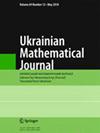双序列求和加权平均法的一些陶伯定理
IF 0.5
4区 数学
Q3 MATHEMATICS
引用次数: 0
摘要
让 p = (pj) 和 q = (qk) 都是非负数的实数序列,其性质是:(\begin{array}{ccccccc}{P}_{m}=\sum_{j=0}^{m}{p}_{j}/ne 0&;{text{and}}& {Q}_{m}=\sum_{k=0}^{n}{q}_{k}\ne 0& \mathrm{for all}& m& {\text{and}}& n.\end{array}\) 另让(Pm)和(Qn)是有规律变化的正指数。假设 (umn) 是复数(实数)的双序列,它是( ( (overline{N }\ ) ,p,q;α,β)可求和的,并且有一个有限的极限,其中 (α, β) = (1,1),(1,0) 或 (0,1)。我们提出了一些权重条件,在这些条件下,(umn) 在普林塞姆意义上收敛。这些结果概括并扩展了作者在[《计算数学应用》,第 62 期,第 6 号,2609-2615 (2011)]中获得的结果。本文章由计算机程序翻译,如有差异,请以英文原文为准。
Some Tauberian Theorems for the Weighted Mean Method of Summability of Double Sequences
Let p = (pj) and q = (qk) be real sequences of nonnegative numbers with the property that
\(\begin{array}{ccccccc}{P}_{m}=\sum_{j=0}^{m}{p}_{j}\ne 0& {\text{and}}& {Q}_{m}=\sum_{k=0}^{n}{q}_{k}\ne 0& \mathrm{for all}& m& {\text{and}}& n.\end{array}\)
Also let (Pm) and (Qn) be regularly varying positive indices. Assume that (umn) is a double sequence of complex (real) numbers, which is ( \(\overline{N }\) , p, q; α, β)-summable and has a finite limit, where (α, β) = (1, 1), (1, 0), or (0, 1). We present some conditions imposed on the weights under which (umn) converges in Pringsheim’s sense. These results generalize and extend the results obtained by the authors in [Comput. Math. Appl., 62, No. 6, 2609–2615 (2011)].
求助全文
通过发布文献求助,成功后即可免费获取论文全文。
去求助
来源期刊

Ukrainian Mathematical Journal
MATHEMATICS, APPLIED-MATHEMATICS
CiteScore
0.90
自引率
20.00%
发文量
107
审稿时长
4-8 weeks
期刊介绍:
Ukrainian Mathematical Journal publishes articles and brief communications on various areas of pure and applied mathematics and contains sections devoted to scientific information, bibliography, and reviews of current problems. It features contributions from researchers from the Ukrainian Mathematics Institute, the major scientific centers of the Ukraine and other countries.
Ukrainian Mathematical Journal is a translation of the peer-reviewed journal Ukrains’kyi Matematychnyi Zhurnal, a publication of the Institute of Mathematics of the National Academy of Sciences of Ukraine.
 求助内容:
求助内容: 应助结果提醒方式:
应助结果提醒方式:


